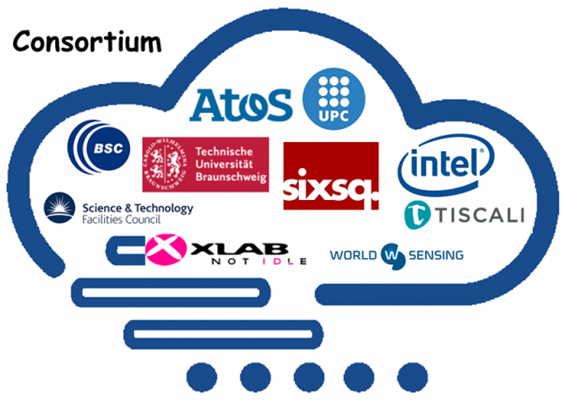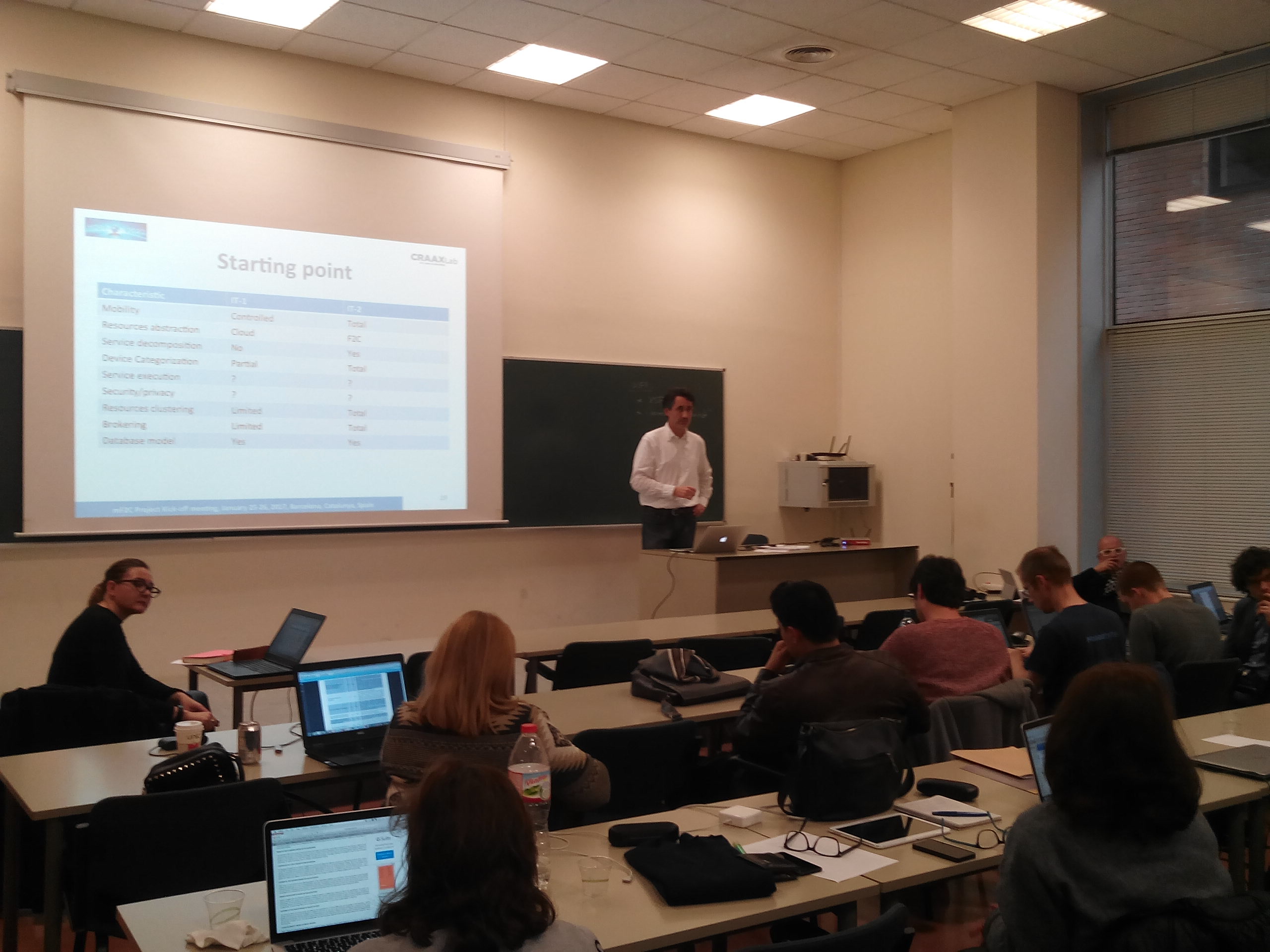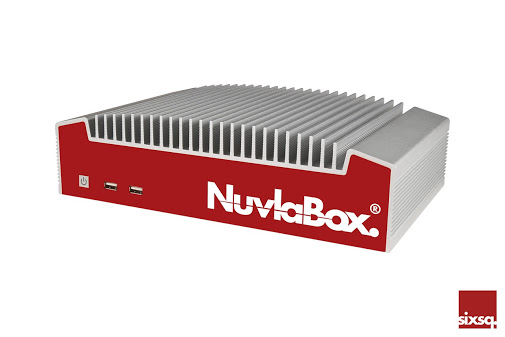We are very happy to welcome you all to the first issue of the mF2C newsletter. Next issues will be periodically published for all the project life, with the aim to disseminate the project results and advances thus widening project outcome impact and easing its potential adoption.
mF2C: “Towards an Open, Secure, Decentralized and Coordinated Fog-to-Cloud Management Ecosystem”
mF2C aim
“The aim of mF2C is to design an open, secure, decentralized, multi-stakeholder management framework, including novel programming models, privacy and security, data storage techniques, service creation, brokerage solutions, SLA policies and resource orchestration methods”
mF2C project details
mF2C is a 36-month Research Innovation Action (RIA) project funded by the European Union under the call H2020-ICT-2016, topic ICT-06-2016 Cloud Computing.
The project, led by ATOS puts together a well-balanced European consortium of 10 partners, including companies, SMEs and research centers from 7 different countries (Spain, UK, Ireland, Germany, Slovenia, Switzerland and Italy).

mF2C objectives
The mF2C project addresses the need for an open and coordinated managing of fog and cloud computing systems, facilitating the efficient usage of resources, balancing service requirements and user demands,trying to target the following objectives:
- Manage a large, decentralized, heterogeneous, open, volatile, dynamic and non-trustable set of resources (from cloud out to the edge of the network).
- Create new fog instances dynamically, facilitating their collaboration (resource sharing) with other fog instances, and associations with cloud computing systems through open interfaces and software compatibility.
- Transparently and optimally to applications, offload computations between fog and cloud computing systems, reallocating both resources and services, as well as executing services in parallel.
- Validate mF2C framework implementing three different pilots in real settings (smart cities, smart navigation, smart hub in airport environment)
- Consolidate European presence in Cloud based research and innovation while collaborating with Standardization bodies.
mF2C Use Cases
The mF2C project proposes three different pilots in distinct domains (smart cities, navigation and transportation), in order to provide a comprehensive and realistic validation scenario for the mF2C framework.
• Emergency Situation Management in Smart Cities (ESM)
Nowadays, more people live in urban environments than in rural ones. It is estimated that this process will not stop and within 20 years the urban population will be around 5 billion of people. The big challenges for the whole society will be related to resource management and mobility throughout these overcrowded environments. Worldsensing works in the development of a model for smart cities. These products intend to solve current and future problems related to the use of private vehicles such as air-pollution, stress, waste of time, accidents. The proposed traffic control use case within mF2C project aims to validate a novel and innovative hybrid architecture that serves 1) to analyse flows of people and vehicles in order to provide useful information to private customers and authorities, 2) to detect a possible emergency in real-time, and 3) to decrease the necessary resources in terms of energy, latency, etc. to respond to specific situations in accordance to the applications requirements.
• Enriched Navigation Service (ENS)
Xlab designs and commercializes Sentinel, which is an IoT device consisting in different sensors currently applied in the navigation sector for vessel monitoring. XLAB has already developed 1,000 Sentinel devices mainly in the Adriatic Sea, aiming at improving quality of the sailor’s journey. As of today Sentinel devices work in an isolated way, hence losing the potential benefits brought by correlated data processing. As a product evolution, XLAB is currently working on the design of novel services enriching the Sentinel port-folio. However, most of the ideas for innovative services require the missing data correlation but also additional capacities such as interaction with external data, etc. Recognized that F2C as the suitable computing technology for Sentinel to be enriched with new services, including the opportunity to use predictive models as well as the interaction with other open source databases, the management framework proposed by mF2C to appropriately orchestrate F2C resources is a must.
• Smart Fog-Hub Service (SFHS)
Tiscali (one of the leading ISP and alternative Telco Operators in Italy, and Europe) is focused on extending the portfolio of products and services offered, and includes in its roadmap the interest in setting up hubs in public environments (e.g. airports, train stations, hospitals, malls and related parking areas) capable of tracking the presence of people and other objects in the field, and develop value added services on top for proximity marketing, prediction of path/behaviour of consumers, and taking real time decisions. The foreseen hubs could form the base for some products to be delivered at home’s premises or could be adapted to be used as a planning tool for determining the number and distribution of people that use (or is expected to use) various services like public transport, etc. This kind of hub can be easily considered as a fog device that should embed cloud connectivity to either process large amount of data or request extra-data – perhaps data coming from other fogs nearby –, scenario defined as Smart Fog-Hub Service (SFHS). Basically the IoT will be driven by business market instead of consumer market, and Tiscali believes that SFHS would be the best way to aggregate business users, design new business scenarios and create value. There is with no doubt that the capacities provided by mF2C will enable the distribution of the processing of data, reducing traffic load between cloud & hub and latency in interactive services.
mF2C Kick-off Meeting. mF2C held its Kick-Off meeting (KOM) in Barcelona on January 25-26th. The meeting was chaired by Atos, as project coordinator, and hosted by UPC. The agenda covered not only a review of the project workplan and insights of the different work packages, but it was also intended to discuss the scientific approach, openning up discussions about the proper way … |
|
|
NuvlaBox and SlipStream training event in Geneva April 4-5SixSQ proposes a training course for mF2C partners, given by SixSq developers. The event will give participants an overview of cloud technologies and their benefits plus practical advice on how to deploy simple and complex applications in the cloud using SlipStream. Further, the NuvlaBox will be used as an edge device, on which dynamic applications can be deployed, monitored and … |
|
|
Euro-Par 2017 mF2C WorkshopEuro-Par is the prime European conference covering all aspects of parallel and distributed processing, ranging from theory to practice, from small to the largest parallel and distributed systems and infrastructures, from fundamental computational problems to full-fledged applications, from architecture, compiler, language and interface design and implementation, to tools, support infrastructures, and application performance aspects. The 1st mF2C workshop will be co-located with Euro-Par at the Escola Técnica Superior de Enxeñaria – USC, Santiago de Compostela, Spain, in August 28-29, 2017. More information about the workshop can be found here |
mF2C Project Review Meeting |
|
|
|
|






